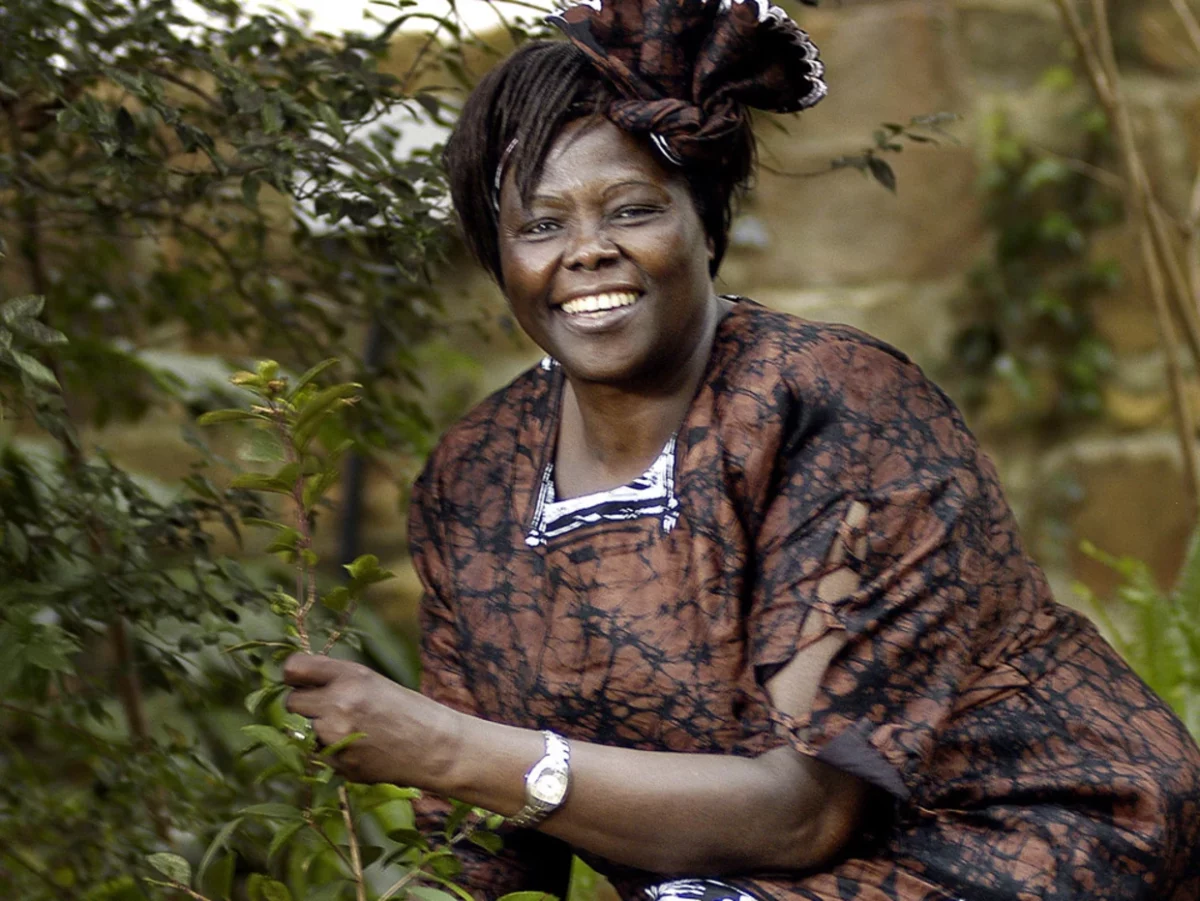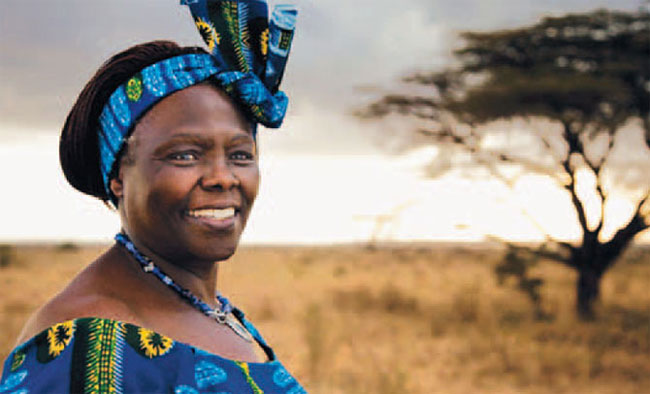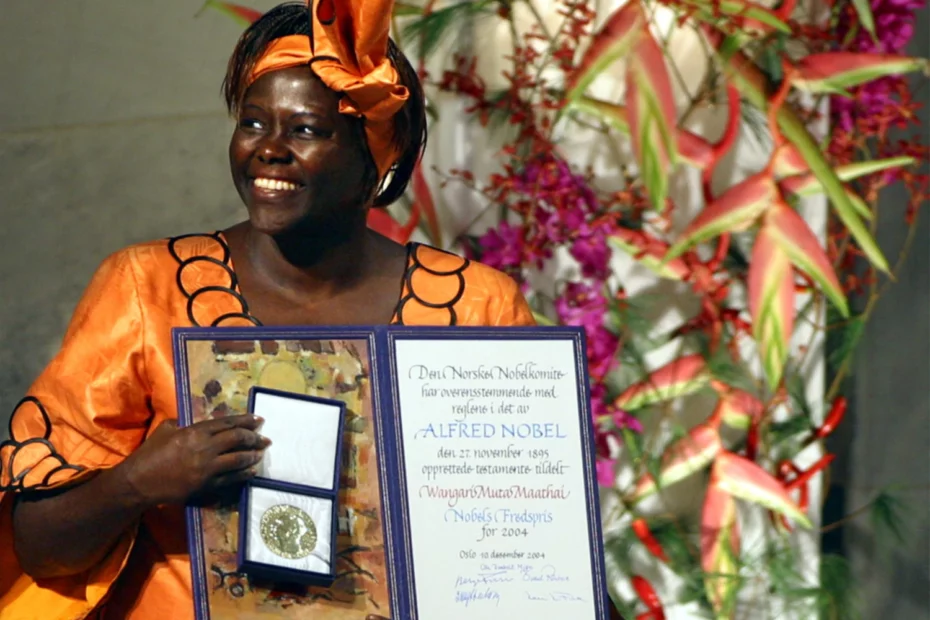The environmental Pioneer, Wangari Maathai, was a remarkable woman of trees. Wangari Muta Maathai was Kenya’s Nobel Peace Prize winner in 2004. The renowned environmentalist and human rights advocate, passed away on September 25 2011, at the age of 71. As a mother of three, she dedicated her life to championing environmental causes and democratic principles. Ms. Maathai voiced deep concerns about poverty in Africa, emphasizing the urgency of addressing disparities. In an exclusive interview with Africa Renewal following her Nobel Prize win, she emphasized the detrimental impact of a small wealthy elite coexisting with a vast population mired in impoverishment. She made history as the first African woman to be honored with the Nobel Peace Prize and as East Africa’s inaugural female doctorate holder in veterinary anatomy, earned from the University of Nairobi after studies in Kenya, the US, and Germany.
Early Life of Wangari Maathai
Wangari Muta Maathai, born in 1940 in the rural area of Nyeri, Kenya, was a lover of books and academics. She attained a Bachelor’s degree in Biological Sciences from Mount St. Scholastica College in Atchison, Kansas (1964) and later pursued higher education, earning a Master of Science degree from the University of Pittsburgh (1966). Her academic journey continued with doctoral studies in Germany and at the University of Nairobi, culminating in a Ph.D. in 1971. At the University of Nairobi, she not only obtained her doctorate but also served as a pioneering figure, becoming the first woman in East and Central Africa to earn a doctoral degree.
Her accomplishments extended beyond her academic pursuits. In 1976, Maathai made history yet again by assuming the role of chair of the Department of Veterinary Anatomy. The following year, she further cemented her legacy by becoming an associate professor. Her rise to these positions marked significant milestones as she became the first woman in the region to hold such esteemed academic positions.
Books she Published
Wangari Maathai wrote four notable books: “The Green Belt Movement,” “Unbowed: A Memoir,” “The Challenge for Africa,” and “Replenishing the Earth.” Her remarkable journey also found its way into various literary works. Additionally, a documentary film titled “Taking Root: The Vision of Wangari Maathai” focused on her and the impactful Green Belt Movement.
The Green Belt Movement: Sharing the Approach and the Experience
(New York: Lantern Books, 2003)
The book detailed the transformation from a single woman’s vision to many individuals planting millions of trees in Kenya. In the book, Professor Maathai delves into the challenges of grassroots mobilization and advocacy. It offers insights into the fundamental principles and operational aspects of managing an environmental non-governmental organization.
Purchase the book here: https://www.amazon.com/Green-Belt-Movement-Approach-Experience/dp/159056040X
Unbowed: A Memoir
(New York: Alfred A. Knopf, 2006; Vintage/Anchor, 2008)
Unbowed narrates the journey of a young girl from Kenya’s Central Highlands who defied norms to become East and Central Africa’s inaugural female Ph.D. holder and the head of a university department in Kenya. Professor Maathai’s confrontations with Kenya’s oppressive government unfold vividly. It led to her realization of tree planting as a means to empower local communities and ignite self-determination. Praised as ‘engrossing and eye-opening’ by Booklist and deemed ‘essential reading’ by the London Sunday Times, Unbowed offers ‘uplifting proof of perseverance’ and celebrates principled individuals who inspire change locally and globally, as hailed by the Washington Post.
Purchase here: https://www.amazon.com/Unbowed-Memoir-Wangari-Maathai/dp/0307275205
The Challenge for Africa
(New York: Pantheon, 2009; Vintage/Anchor, 2010)
In her in-depth analysis of Africa, Professor Maathai explores both optimism and practical solutions for change. She examines the major obstacles to development at global, national, and personal levels, including cultural shifts, environmental decline, and ongoing poverty. Emphasizing the need for self-action, she highlights the responsibility and accountability of Africans, outlining essential steps they can take for their progress.
Purchase Here: https://www.amazon.com/Challenge-Africa-Wangari-Maathai/dp/0307390284
Replenishing the Earth: Spiritual Values for Healing Ourselves and the World
(New York: Doubleday Image, 2010)
Professor Maathai says that following traditional spiritual values is key to both self-empowerment and taking care of our planet. These values include respecting nature, improving ourselves, being grateful, and helping others. They guide the Green Belt Movement’s work. Even though she’s Christian, Maathai finds inspiration in different beliefs. Examples include the Jewish idea of fixing the world and the Japanese principle of not wasting. She thinks that if we focus on these values, we can heal ourselves and the Earth.
Purchase the book here: https://www.amazon.com/Replenishing-Earth-Spiritual-Healing-Ourselves/dp/030759114X
Other Publications that Feature the Green Belt Movement and Professor Maathai
| Speak Truth to Power by Kerry Kennedy Cuomo (Routledge, 2000) Women Pioneers for the Environment by Mary Joy Breton (Northeastern, 1998) Hope’s Edge: The Next Diet for a Small Planet by Frances Moore Lappé and Anna Lappé (Tarcher, 2002) Flight of the Hummingbird: A Parable for the Environment by Michael Nicoll Yahgulanaas (Greystone, 2008) Mama Miti: Wangari Maathai and the Trees of Kenya by Donna Jo Napoli and Kadir Nelson (Simon & Schuster, 2010) Planting the Trees of Kenya: The Story of Wangari Maathai by Claire A. Nivola (Farrar, Straus, 2008) Seeds of Change: Wangari’s Gift to the World by Jen Cullerton Johnson and Sonia Lynn Sadler (Lee & Low, 2010) Wangari’s Trees of Peace: A True Story from Africa by Jeanette Winter (Harcourt, 2008 |
Wangari Maathai’s Environmental Journey: Green Belt Movement

Founding the Green Belt Movement in 1977, Ms Maathai aimed to counter environmental degradation, poverty, and conflicts by planting trees across Kenya. She believed in the link between preserving the environment and eradicating poverty, famously stating,
“Poor people will cut the last tree to cook the last meal.”
The environmental Pioneer, Wangari Maathai’s movement mobilized millions, particularly women. So far, under the leadership of Wanjira Mathai, the movement has planted over 53 million trees in Kenya. Her efforts also inspired a United Nations campaign that globally led to the planting of 11 billion trees, benefiting over 900,000 Kenyan women who sold seedlings for reforestation. Operating across grassroots, national, and international domains, GBM focuses on fostering environmental conservation, enhancing climate resilience, and empowering communities, with particular emphasis on women and girls. Its mission extends to creating democratic opportunities and promoting sustainable livelihoods.
Their vision revolves around fostering a society driven by values, where individuals consciously work towards improving their lives while contributing to a cleaner, greener world. Greenbelt’s mission focuses on better environmental management, community empowerment, and livelihood improvement, using tree planting as a starting point. Their core values include a love for environmental conservation, self and community empowerment, volunteerism, and upholding accountability, transparency, and honesty.
Political Struggle in Kenya
Recognizing the power of purposeful political leadership, Ms Maathai asserted that the tree symbolized Kenya’s democratic struggle. Her activism against former President Daniel Arap Moi led to confrontations, including physical assaults and political dismissals. Despite these challenges, she persevered, and with President Moi’s departure in 2002, she found a more supportive political landscape. Winning a parliamentary seat, she became an assistant minister of the environment. However, her involvement in opposition politics resulted in her dismissal from the cabinet and subsequent loss of her parliamentary position amid contentious elections.
Environmental Pioneer: Wangari Maathai won the Nobel Peace Prize in 2004
Wangari Maathai was the first woman to win the Nobel Peace Prize in 2004 for her impactful work. The Norwegian Nobel Committee praised her dedication to “sustainable development, democracy, and peace.” They highlighted her leadership in advocating for ecologically sound progress in Kenya and Africa. In addition, they emphasized her dedication to integrate democracy, human rights, and women’s rights.
Maathai was recognized for her global thinking and local actions. Upon receiving the award, she expressed that the Nobel committee’s message affirmed that safeguarding the environment is crucial for peace, seeing it as an essential part of peace efforts. She emphasized that their work extended beyond planting trees; it was about empowering people to shape their environment, governance, lives, and future.
Wangari Maathai’s Speech after winning the Nobel Peace Prize in 2004

The environmental Pioneer, Wangari Maathai, a remarkable woman of trees acknowledged the prize by saying
“As the first African woman to receive this prize, I accept it on behalf of the people of Kenya and Africa and indeed the whole world. Although this prize comes to me, it acknowledges the work of countless individuals and groups across the world.”
She further added that, working diligently and often without acknowledgement, these individuals dedicate themselves to safeguarding the environment, advancing democracy, championing human rights, and advocating for gender equality. Through these efforts, they sow the seeds of peace. Today, it is evident that they, too, take pride in this recognition.
Wangari Maathai expressed gratitude to the resilient people of Kenya for their enduring hope in achieving democracy and sustainable environmental management. She acknowledged the profound privilege of standing among esteemed African Peace Laureates, including President Nelson Mandela, F.W. de Klerk, Archbishop Desmond Tutu, Chief Albert Lutuli, Anwar al-Sadat, and UN Secretary-General Kofi Annan. Maathai recognized the encouragement this recognition brought to Africans across the continent. Urging fellow Africans to leverage this acknowledgement, she called for a deeper commitment to democratic governance, human rights, and environmental protection. She conveyed confidence in Africa’s ability to rise to the challenges, emphasizing her belief that solutions to many of their issues would stem from within their communities.
Bottomline
This won’t be the last time we honour Wangari Maathai. Hailing from Kenya, Maathai was a prominent environmental activist, a Nobel Peace Prize Laureate in 2004, an author of four books, and the founder of the Green Belt Movement. Among her achievements, she held the distinguished positions of chair of the Department of Veterinary Anatomy and professor, marking her as the first woman in East and Central Africa to earn a doctorate.
Her legacy expands beyond these milestones. Recognized for her tireless activism in championing democracy and human rights and her role as an educator, Maathai remained deeply committed to Kenya and her fellow Africans. Her enduring impact elevated her to become one of Africa’s most renowned and respected women on the global stage. Without a doubt, the environmental Pioneer, Wangari Maathai, was a remarkable woman of trees.



